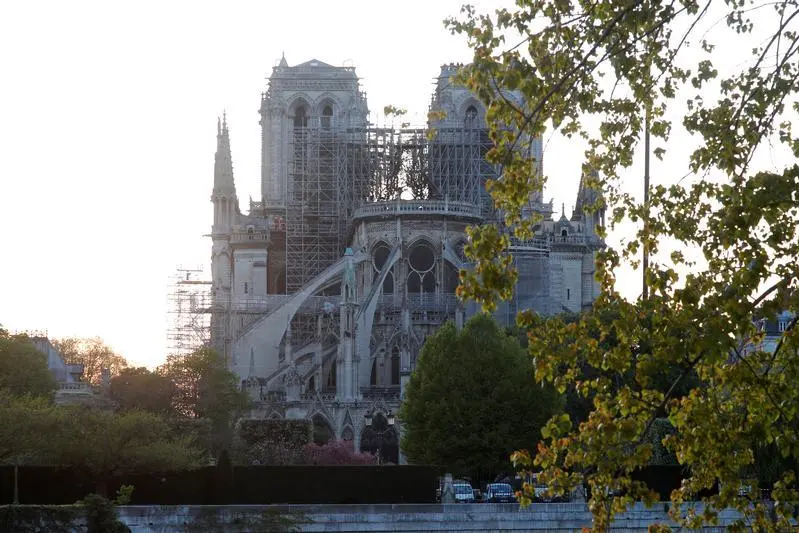PHOTO
LONDON - Until this week, few were keen to pay for keeping Notre-Dame de Paris safe and sound. The French government did not want to cough up the 150 million euros needed for maintenance, and the Catholic archdiocese had other priorities. Repairs were underway, but the funding was uncertain.
The idea of a global campaign to take advantage of the cathedral’s iconic status looked like a hard slog. While everyone loved the 850-year-old pile, it was always someone else’s job to pay for its upkeep. The great rich families of France – for example the Arnault, Pinault and Bettencourt clans – were not opening their wallets.
Monday’s gigantic fire has burned all such reluctance away, along with the spire and most of the roof of Paris’s central tourist attraction. Even before the flames had died down, French President Emmanuel Macron had made an open-ended commitment on behalf of the state. Those leading families have all promised big money as has oil giant Total, not to mention the European politicians who want to make this an EU project.
At last count, the pledges surpassed 800 million euros. Smaller contributions, from 10 million euros downward, are also pouring in. The total cost of repairs is not yet known, but the private donations are so large that taxpayer largesse may not even be necessary.
Michel Aupetit, the archbishop of Paris, can offer semi-ironic thanks to God for this disaster. The French Catholic Church has long struggled to pay for the upkeep of its numerous beautiful, old and increasingly empty churches. Considering the decline of Christian practice in Europe and France’s longstanding tradition of anti-clericalism, it is almost miraculous that a big cathedral, partially destroyed, will be made great again. Like Joan of Arc, Notre-Dame de Paris seems to have transcended its religious identity.
Less faithful observers may be more sceptical. The money which is flowing freely now would have been just as useful, perhaps more so, for maintaining the religious patrimony of France, Europe or the world a few weeks ago. It was not available then. Nor is it likely to be available soon for less picturesque causes. On Tuesday the Friends of Notre-Dame de Paris foundation expressed frustration that far more than the 150 million euros it had requested in 2014 for restoration work has now been pledged, according to the Financial Times.
Of course, a big blaze does change things for donors. Their flashy donations attract attention and worldly praise – and provide an opportunity for rival billionaires, including Bernard Arnault, boss of luxury group LVMH, and Francois-Henri Pinault, who runs Gucci owner Kering, to fight over who can be the most generous.
The burst of enthusiasm fits a pattern which is well known to experts in religious conversion – disasters and tragedies often open wallets as well as hearts. The best fundraiser could hardly have designed a more moving experience than this one. Drone photographs showed a breathtaking cruciform fire in the most familiar part of a great city. Crowds of believers praying and singing outside added a sublime chorus to the visual horror. The scene invited the dramatic response it received.
The money came without asking, even if the donors’ motives are not entirely pure. As long as they can restrain themselves from self-aggrandisement, they should be able to avoid the mockery which often accompanies too-close combinations of the profane and the sacred.
Moreover, the explosion of high-profile generosity shows the same mix of motivations as more run-of-the-mill charitable giving – good will, vanity, nobility and the fear of being accused of greediness in this world, or punished for it in the next. In other words, the reasons range from quite selfish to purely generous.
World-weary people looking on this melange might simply deny the virtue of almost all rich people who choose to give away some of their surplus funds. A century ago the British politician Clement Attlee expressed that sentiment in terms that might still seem relevant: “If a rich man wants to help the poor, he should pay his taxes gladly, not dole out money at whim.” Something similar could be said of under-taxed companies and individuals.
It’s not so simple, though, and not only because governments often fail to help the poor or to maintain cultural treasures. It is better, perhaps, to remember a saying which has been repeated over the centuries from the still-standing pulpit at Notre-Dame de Paris. It comes from the biblical Acts of the Apostles, where it is attributed to Jesus: “It is more blessed to give than to receive.”
People raising money for other good causes should not be overcome by jealousy at Notre-Dame’s new treasure. The outcome is ultimately, in large part, a testimony to the wealth of human generosity, with or without the hand of God.
On Twitter https://twitter.com/edwardhadas
(The author is a Reuters Breakingviews columnist. The opinions expressed are his own.)
(Editing by Richard Beales and Bob Cervi) ((edward.hadas@thomsonreuters.com; Reuters Messaging: edward.hadas.thomsonreuters.com@reuters.net))





















